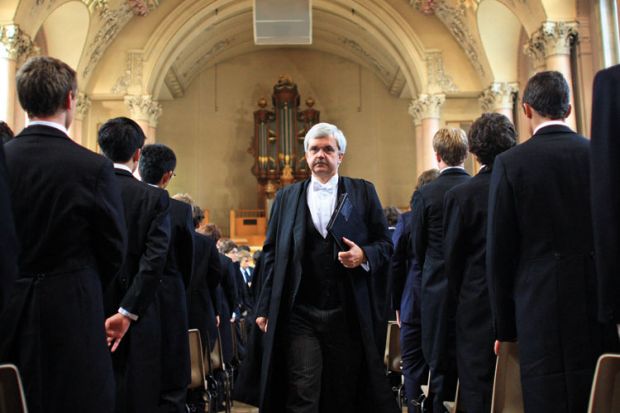The outgoing headmaster of one of the UK’s most prestigious private schools has lamented university teaching standards, suggesting that lecturers would benefit from spending time in the secondary classroom.
Tony Little, who steps down from Eton College this summer after 13 years, told Times Higher Education that there was a “gulf” between the experience of students in the final years of school and the first year of university “that should be bridged and we have failed to do it”.
“I have students coming back saying that, in some cases, the quality of teaching in the sixth form was better than anything at university,” Mr Little said. “It is not right.”
The gap in teaching standards between sixth forms – in both the state and independent sectors – and university was increasing, Mr Little suggested, because of the “huge emphasis” on pedagogy at school level in recent years.
Moves to make A-level exams “more accessible” by reducing the essay-based content had also widened the divide between secondary and higher education, Mr Little said, since this remained a primary method of assessment at university.
He acknowledged that some institutions, such as the University of Reading and Brunel University London, had already invested heavily in first-year teaching standards.
But he argued that there was a long way to go across the sector as a whole. “There is some outstanding stuff going on with the younger generation of teachers and I don’t see this replicated in any way at university level,” Mr Little said.
The intervention came after Jo Johnson, the universities minister, identified higher education teaching standards as his foremost priority. Plans for a teaching excellence framework will be announced later this year.
Mr Little, a graduate of Corpus Christi College, Cambridge, suggested that giving teaching greater recognition would help to drive up standards. “The business of developing a career within a university is predicated on your ability to produce good research,” he said.
“The business of being a teacher is way down the list of priorities. It is not traditionally perceived to be important, people aren’t trained in it, and no credit is given to teaching.”
Mr Little also argued that more was needed for there to be a “really effective conversation” about teaching between schools and universities.
He said that he would require lecturers who were responsible for first-year teaching to “spend some time in good schools, talking to departments, seeing what a teacher does”.
“That would be beneficial, and it would be beneficial for teachers to have a better sense of what a university lecturer does,” he added.
With fees of £34,434 a year and a record of securing places at leading universities for its students, Eton has long been a target for social mobility campaigners.
Mr Little, who is joining a Dubai-based chain of independent schools, highlighted Eton’s £6 million annual spend on bursaries and its partnerships with state schools in Slough and East London, which have helped to widen university participation.
He said that this success was probably “related” to the fact that as many as 97 per cent of the pupils involved were from ethnic minorities. “If you go to parts of rural England, the level of aspiration is much more limited and that is our battleground.”
Mr Little was speaking ahead of the publication next week of his book, An Intelligent Person’s Guide to Education.




